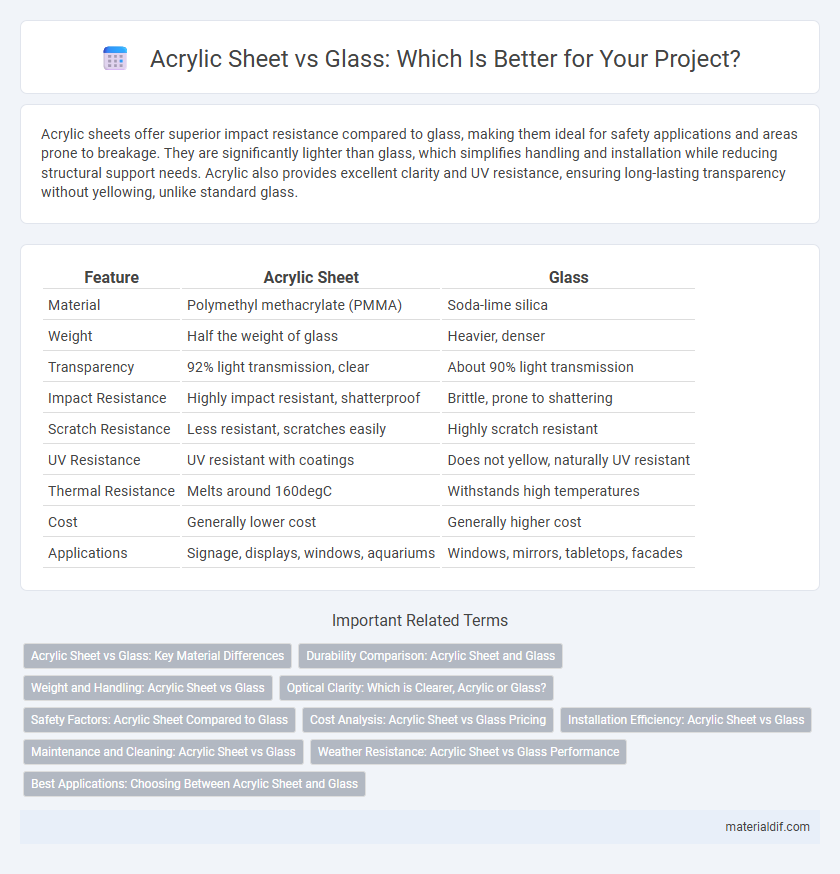Acrylic sheets offer superior impact resistance compared to glass, making them ideal for safety applications and areas prone to breakage. They are significantly lighter than glass, which simplifies handling and installation while reducing structural support needs. Acrylic also provides excellent clarity and UV resistance, ensuring long-lasting transparency without yellowing, unlike standard glass.
Table of Comparison
| Feature | Acrylic Sheet | Glass |
|---|---|---|
| Material | Polymethyl methacrylate (PMMA) | Soda-lime silica |
| Weight | Half the weight of glass | Heavier, denser |
| Transparency | 92% light transmission, clear | About 90% light transmission |
| Impact Resistance | Highly impact resistant, shatterproof | Brittle, prone to shattering |
| Scratch Resistance | Less resistant, scratches easily | Highly scratch resistant |
| UV Resistance | UV resistant with coatings | Does not yellow, naturally UV resistant |
| Thermal Resistance | Melts around 160degC | Withstands high temperatures |
| Cost | Generally lower cost | Generally higher cost |
| Applications | Signage, displays, windows, aquariums | Windows, mirrors, tabletops, facades |
Acrylic Sheet vs Glass: Key Material Differences
Acrylic sheets offer higher impact resistance, weighing about half as much as glass, making them ideal for applications requiring durability and lightweight properties. Unlike glass, acrylic provides superior UV resistance and clarity, with better insulation and shatterproof characteristics, enhancing safety and energy efficiency. However, acrylic is more prone to scratching and can be less heat resistant than glass, which remains favored for its rigidity and scratch durability in high-temperature environments.
Durability Comparison: Acrylic Sheet and Glass
Acrylic sheets exhibit superior durability compared to glass due to their impact resistance, which is up to 17 times greater, reducing the likelihood of cracks or shattering upon impact. While glass is more prone to breakage and chipping, acrylic's flexible nature enables it to withstand bending and stress without damage. This makes acrylic sheets an ideal choice for applications requiring enhanced toughness and safety.
Weight and Handling: Acrylic Sheet vs Glass
Acrylic sheets weigh approximately 50% less than glass of the same thickness, making them significantly easier to transport and install. The lighter weight reduces strain during handling and lowers shipping costs, especially for large panels. This advantage in weight and handling makes acrylic sheets a preferred choice for applications requiring frequent adjustments or installations.
Optical Clarity: Which is Clearer, Acrylic or Glass?
Acrylic sheets offer superior optical clarity with light transmittance of approximately 92%, surpassing typical glass, which allows around 88-90% light passage. Unlike glass, acrylic is free from minor impurities and has less internal reflection, enhancing visual sharpness and reducing distortions. This makes acrylic sheets a preferred choice for applications demanding clearer, more vibrant visibility compared to traditional glass panels.
Safety Factors: Acrylic Sheet Compared to Glass
Acrylic sheets offer superior safety compared to glass due to their impact resistance, being up to 17 times stronger and less likely to shatter or cause injury upon breakage. Unlike glass, acrylic's lightweight and flexible properties reduce the risk of cracks and sharp fragments, making it ideal for environments requiring enhanced safety. This makes acrylic sheets especially suitable for child-safe windows, protective barriers, and areas prone to high impact.
Cost Analysis: Acrylic Sheet vs Glass Pricing
Acrylic sheets generally cost between $15 and $30 per square foot, significantly lower than glass, which ranges from $30 to $60 per square foot depending on thickness and type. The affordability of acrylic is driven by lower manufacturing and shipping expenses due to its lightweight nature, providing budget-friendly options for large installations. Cost-efficiency makes acrylic sheets a preferred alternative in applications where durability and impact resistance are required without the higher price tag of glass.
Installation Efficiency: Acrylic Sheet vs Glass
Acrylic sheets offer superior installation efficiency compared to glass due to their lightweight nature, reducing handling time and labor costs. Their impact resistance minimizes breakage during installation, streamlining the process and lowering replacement expenses. Acrylic's ease of cutting and shaping on-site further accelerates fitting, making it a preferred choice for fast and flexible installations.
Maintenance and Cleaning: Acrylic Sheet vs Glass
Acrylic sheets require less maintenance than glass due to their resistance to shattering and lightweight nature, reducing the risk of damage during cleaning. Unlike glass, acrylic can be cleaned with mild soap and water or specialized plastic cleaners without harsh chemicals that may cause scratching or clouding. Regular dusting and avoiding abrasive materials help maintain acrylic's clarity, whereas glass is more tolerant of common window cleaning solutions and tools.
Weather Resistance: Acrylic Sheet vs Glass Performance
Acrylic sheets demonstrate superior weather resistance compared to glass, maintaining clarity and structural integrity despite prolonged exposure to UV rays and harsh environmental conditions. Unlike glass, which is prone to shattering and weather-induced degradation, acrylic resists yellowing and cracking, making it ideal for outdoor applications. This durability ensures acrylic sheets offer a longer lifespan with minimal maintenance in areas subject to fluctuating weather.
Best Applications: Choosing Between Acrylic Sheet and Glass
Acrylic sheets offer superior impact resistance and lightweight properties, making them ideal for applications like protective barriers, signage, and aquariums where durability and safety are priorities. Glass excels in clarity and scratch resistance, making it the preferred choice for windows, picture frames, and high-end display cases requiring a pristine, scratch-free surface. When selecting between acrylic and glass, consider factors such as strength, weight, cost, and the intended environment to ensure optimal performance and longevity.
Acrylic Sheet vs Glass Infographic

 materialdif.com
materialdif.com